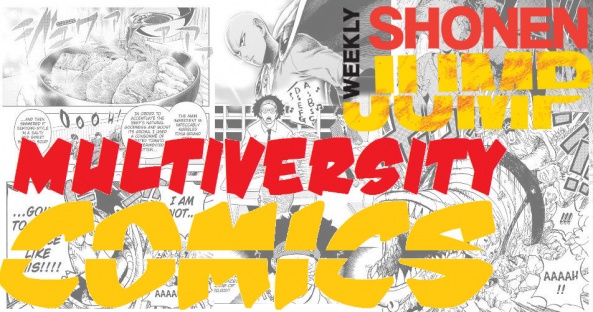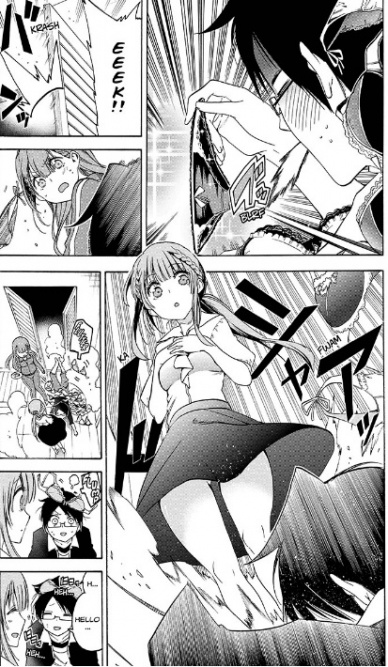
Welcome to This Week in Shonen Jump, in which a rotating duo of Multiversity staffers take a look at two stories contained in each installment of Viz Media’s Weekly Shonen Jump. For the uninitiated, Weekly Shonen Jump is an anthology that delivers more than 200 pages of manga of all varieties. We hope that you’ll join us in exploring the world of Weekly Shonen Jump each week. If you are unfamiliar, you can read sample chapters and subscribe at Viz.com.

This week, Robbie and Ken check in with “We Never Learn” and “E No Genten.” If you have any thoughts on these titles, or “Black Clover,” “Dr. Stone,” “The Promised Neverland,” “Food Wars,” “Blue Exorcist,” “Seraph at the End,” “Robot X Laserbeam,” “One Piece,” or “My Hero Academia,” let us know in the comments!

E No Genten: Starting Point
Written & Illustrated by Naoshi Komi
Reviewed by Ken Godberson III
Listen. I like video games. I like them a lot. Hell, in between writing this review I’ve probably put another bit into Persona 5 while also staring into the Abyss. And while it’s certainly not to my taste, I understand the idea of E-Sports well enough and see why someone would be into that sort of thing. It’s as valid as any other sport and there can be some sweet money if you’ve got the skills to make it big. I get all that.
That said: “E No Genten: Starting Point” is bad. Like, really bad. To the point where I’m not sure this one-shot -which feels Part-PSA Part-Pilot- was supposed to be a parody of shonen sport manga. Because if it was… well it still wouldn’t be good, but it would be at least a bit more sensible.
We start our story with our protagonist, Takumi Tomouchi a High Schooler who has been playing video games his whole life. The thing is, that seems to (at least in his mind) be the only thing he is good at. His grades are atrocious and he’s reprimanded for all the time he spends playing video games. Someone else that criticizes him is Satsuki Minihara, the no-nonsense class rep who is always on Tomouchi’s case. However, there’s more to Minihara than meets the eye as it is revealed that she herself is a gamer, but is one way better at Tomouchi’s game of choice, “CODAS”, than he is.
It’s revealed that when she’s not at school, Minihara is part of a group striving to be a pro gamer. This is where the story shifts into that “Part-PSA” portion where explains what E-Sports are and how it’s not a big thing in Japan yet, even if it is catching on. So begins Tomouchi’s training to be a better video game player leading up to a big “CODAS” Tournament. We also learn at this time Tomo’s motivation to be a pro-gamer, about her father taking her to a competition abroad and seeing adults take something she enjoyed so seriously.
Now, up to this point, the story has just been a bit insipid. Here’s where it gets dumb. Minihara gets hit by a car. Yeah, you read that right. It comes just as much out of left field in the manga as it did in this paragraph. She doesn’t die, but the injuries cause her hands to tremble, essentially knocking her out of the competition and forcing Tomouchi to step up. Tomouchi, using his training, manages to win with Minihara watching via livestream, concluding the one-shot.
The problem with this story is that it is so cliche to the point where I was seriously wondering if this was a parody. You have the bland “everyman” protagonist whose alleged only skill is the sport, in this case, video games. It’s to the point where his inner monologue mentions it to the point of beating you over the head. You also have Minihara who comes off as the stereotypical uptight girl who, despite the background we get with her, comes off as motivation for our protagonist. I’m not lying when I say that what happened to here was, outside of being kinda sexist, so out of nowhere that that I got whiplash from it. On top of that, even if this was just meant to talk about E-Sports, it only just very surface detail talks about it.
Continued belowIf anything, the art of this book is its saving grace. Naoshi Komi’s artwork isn’t bad. It’s very expressive (a standout scene being Tomouchi’s slight breakdown after getting thoroughly beaten changing into complete shock watching Minihara take over for him) and the fight scenes taking place within the video game are nice, if brief. I’m very grateful that Minihara isn’t sexualized at all. I know that it may feel weird to mention that, but considering what happened to her here (not to mention just general conventions in shonen manga) I wouldn’t have been shocked. “It does its job well,” is the best way to describe the art and could be found in a average sport manga.
“E No Genten: Starting Point” is a one-shot that really shows no effort beyond its basic mission: talking about E-Sports. Everything else about it has been done before and done a lot better. Maybe one day there can be a sport manga based around e-sports, but this is not what would kickstart that.
Final Verdict: 4.2- A very trite, cliche story that barely goes into anything about the subject it wanted to talk about.

We Never Learn Chapter 45
Written and illustrated by Taishi Tsutsui
Reviewed by Robbie Pleasant
With how often I complain about this series, given the fact that I keep coming back to it, perhaps the one that truly never learns… is me.
Nah, it’s really more the mangaka, who continues to repeat the same story points with very little in the way of actually progressing anything. Every now and then we get a little glimpse of what is actually good character building and development, only to have it be tossed aside as the next chapter falls right back into blatant fanservice and repetitive plots that even the oldest of romantic comedies has already driven into the ground.
In this case, we get a chapter focusing on the (surprisingly young, of course) teacher, Kirisu-sensei, and her visiting sister. So of course, Yuiga, our generic protagonist who everyone likes because he’s earnest, intelligent, hardworking, and has no other qualities whatsoever, has to help her clean up. Then he gets stuck in a closet, borderline-sexy hijinks almost ensue, misunderstandings happen, and suddenly he’s going to spend a lot of time with the sister character, who also happens to be a famous figure skater.
I would like to note at this time that writing that paragraph then caused me to slam my head against the keyboard repeatedly.
And yet, between all that insanely convoluted and still cliche nothing, we still had just a hint of character moments for the teacher. Yet before that could be elaborated on at all, the scene suddenly shifts into another pointless misunderstanding, giving the mangaka an excuse to draw people in a bath.
If the rest of this review is at all incoherent, you’ll have to forgive me, for I just slammed my head against the keyboard again, and might have caused moderate brain damage.
Look, I don’t hate this series in theory, I just hate what it’s doing. It has a good core concept, and could have done a lot to develop the characters it has, to give us more growth and development with them, and grow their relationships in an organic, well-paced manner that lets us root for them or feel their pain when things don’t go as well as hoped. Instead, what we get are pointless fanservice scenes, Yuiga constantly winding up in someone’s closet, or trapped under someone’s bed, or stuck in a sauna, and entire chapters dedicated to misunderstandings about grade letters and bra sizes, while superfluous side-characters are added to be pointless additions to a harem we don’t need.
And I don’t hate harem series either. “Love Hina,” “Ranma 1/2,” “Mahou Sensei Negima,” these are all series with harem elements that still take the time to develop their characters and build the stories while even including some cheap fanservice. It can be done right, but “We Never Learn” is just doing it wrong.
As mentioned the last time I looked at this series, the art is actually quite good. The characters are very expressive, and each has a design that’s brimming with personality. There’s a good amount of detail in each moment and image that it’s pleasant to flip through.
Continued belowThe panels are spaced just right to provide proper pacing throughout each moment, and are even sized in such a way to add to the wide feeling of the room or the claustrophobia of the closet. As far as art and style goes, I can’t complain.
Story-wise, though, there’s just so much wasted potential, and that’s much harder to forgive.
Final Verdict: 3.1 – This could be so much better, if it just focused on the characters instead of finding more ways to put Yuiga in moderately sexual situations. But it doesn’t. And we’re all poorer for it.



